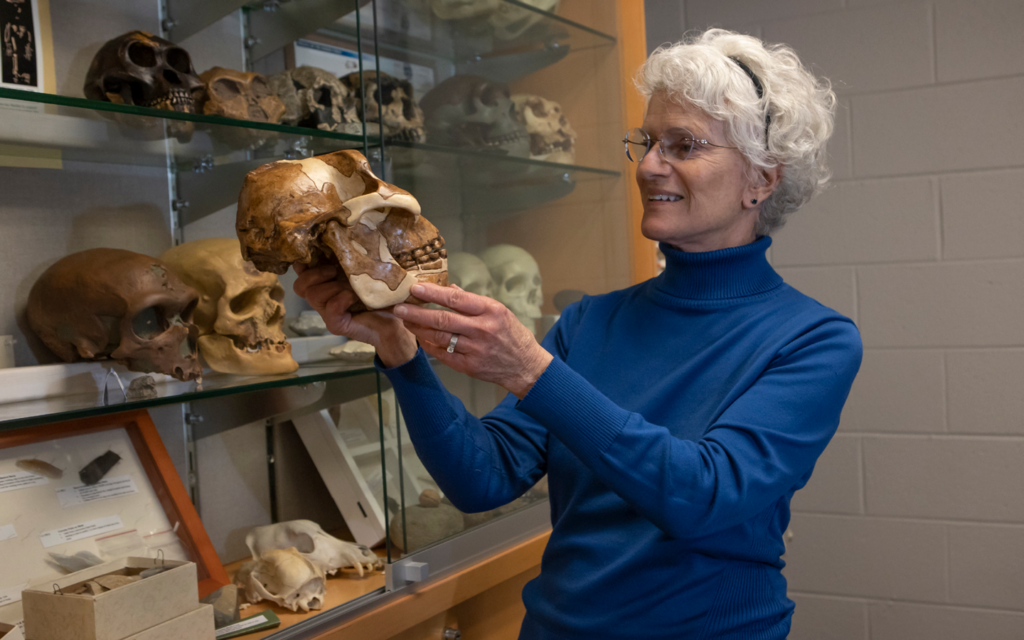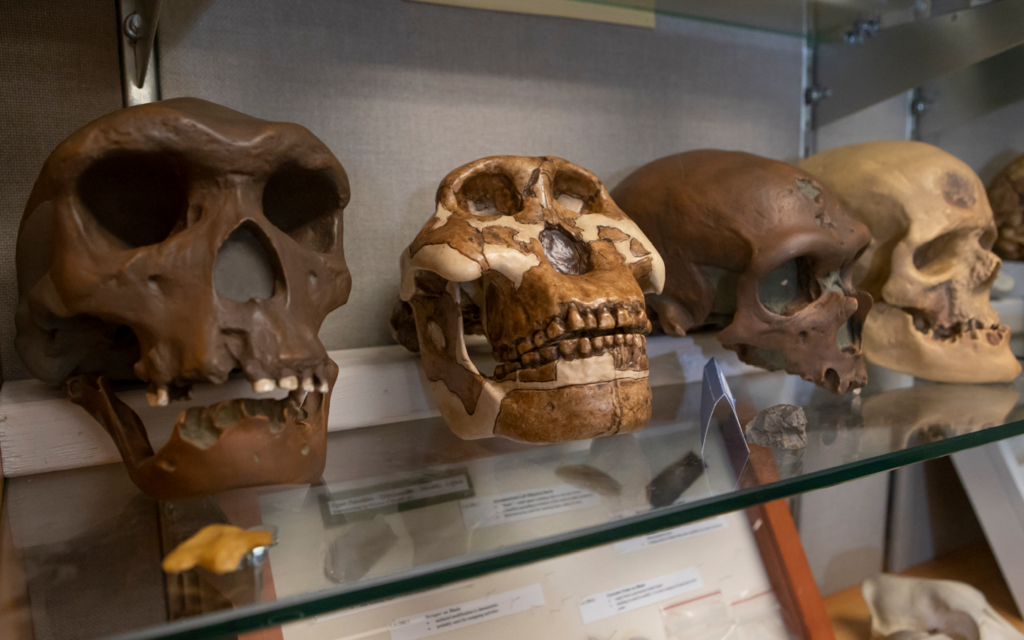Today for Faculty Spotlight we’re sitting down with Josselyn Moore, Professor of Anthropology. Professor Moore also previously taught Sociology and served the College in a leadership position with the Schoolcraft College International institute (SCII).
Schoolcraft College: Hello, Professor Moore! Tell us a little about your background and your career at Schoolcraft College.
Professor Josselyn Moore: I have always been interested in digging things out of the earth – fossils, bones, ancient civilizations. Initially, I thought I might be interested in classical archaeology with a focus on Greco-Roman civilization, but when I took my first anthropology course at Washington University in St. Louis, I was hooked. Anthropological archaeology is just as likely to dig through people’s garbage in order to reconstruct the daily lives of ordinary folks.
I continued my education at Hunter College, City University of New York, in New York City, where I earned a Master of Arts in Anthropology. While I was there, I worked at the American Museum of Natural History. It was exciting to walk past amazing displays every morning as I made my way to the office. Ultimately, I wound up in the doctoral program in Archaeology at the University of Michigan Ann Arbor.

Anthropological training typically involves fieldwork, and mine included Navajo and Anasazi archaeology at Black Mesa, Arizona, as well as ethnographic experience in Tecualtitan, a small subsistence farming village just outside of Guadalajara, Mexico.
Before coming to Schoolcraft as full-time faculty, I worked as a part-time instructor for a dozen years at five different colleges in the southeast Michigan area – ranging from Albion College and Schoolcraft to Jackson Community College at the Southeast Michigan State Prison.
This broad experience gave me an opportunity to become acquainted with a variety of institutional cultures and student demographics. I was fortunate to get a full-time position at Lansing Community College where I served both as faculty and in administration. When a position opened up at Schoolcraft, I eagerly applied for the job – and got it! For me, it was like coming home: I am able to live and teach in the same community.
Schoolcraft College: You are a Professor of Anthropology. Sometimes this field of study gets confused with archaeology. Please define anthropology for us.
Professor Josselyn Moore: Anthropology is the scientific study of humankind – in all times and places. Typically, anthropologists are trained in one of four subdisciplines – Archaeology, Cultural Anthropology, Anthropological Linguistics or Physical Anthropology. Although we specialize, an anthropologist’s work is informed by the tools and insights of the sister subdisciplines. For example, an archaeologist would use ethnographic data to guide their reconstruction of the excavated culture.
In addition to the traditional four fields, a central concern in Anthropology is applied anthropology, which uses the tools of anthropology to address pressing issues in today’s complex and rapidly changing world.
Schoolcraft College: We have two new Anthropology courses that will be offered soon. Please tell us about them. (ANTH 220, Environmental Anthropology; and ANTH 230, Medical Anthropology.)
Professor Josselyn Moore: The Anthropology Department is excited to be able to offer these new courses. Look for Environmental Anthropology in Fall 2022 and Medical Anthropology in Winter 2023.
Anthropology brings a unique cross-cultural perspective and historical depth to both of these current and compelling topics. Environmental Anthropology studies the relationship between human populations—past and present—and their ecosystems, and encompasses topics such as globalization, structural inequalities, conservation, and sustainability. Understanding how various cultures over time understand and relate to their environment might be able to yield insights as the world charts a path into the future.
Medical Anthropology offers a cross-cultural analysis of disease, medicine and health. Special attention is focused on globalization, inequity, nutrition and public health. Understanding the perspectives of other cultures offers applications in today’s health care industry that serves multi-ethnic communities.
Schoolcraft College: You also served Schoolcraft College as part of the leadership team with our International Institute. Please tell us about that.
Professor Josselyn Moore: The Schoolcraft College International Institute (SCII) strives to coordinate cross-cultural learning opportunities for campus and the community by infusing international content into coursework, programs, and other Schoolcraft College activities. The goal is to develop an appreciation of the diversities and commonalities among world cultures, and better understand the global forces shaping our lives.

I served as the Coordinator, and then Co-Coordinator, of the International Institute from 1997-2016. This faculty-driven, grass-roots initiative prospered from robust campus and administrative support. As more faculty came on board, there was an astonishing proliferation of initiatives in the few years between 2001-2006. These included the Multicultural Fair, GlobalEYEzers, the Focus Series, Global Endorsement, as well as the rebirth of the “International Agenda” publication, all of which remain as enduring products of this period of expansion.
Frankly, this was an idea whose time has come. The SCII was a committed group of faculty, as well as staff, who were simply in the right place, at the right time.
In 2017, I stepped back from SCII leadership to allow time for a smooth transition to new leadership, with fresh talents and new visions. Now, I am able to focus on Anthropology – the reason that I went into teaching in the first place.
Schoolcraft College: Looking back at more than a quarter-century of service to Schoolcraft College, what stands out to you? What are some of the big changes you’ve seen over the years?
Professor Josselyn Moore: Schoolcraft College has managed to define itself as an attractive and cost-effective alternative to first years of college. When I first arrived as a part-time instructor, even landscaping and signage were sparse. The physical campus has become more public-facing, welcoming not only students and the public. And, yes, more structures. Exemplary programs, like Culinary Arts, Computer Graphics and more have put Schoolcraft on the map.
It has been astonishing how adeptly Schoolcraft College has adapted to our changing society. Automotive repair is gone. Ultrasound technology is in.
Schoolcraft College: Is there anything else you would like to add?
Professor Josselyn Moore: I would be remiss not to mention the incredible challenges we have all faced the past couple of years, with COVID. Many of our students have managed to continue their education. College is never easy. Layer COVID on top of that and this presents formidable challenges for students – as well as our staff and faculty. Their persistence and commitment to education is to be celebrated.
